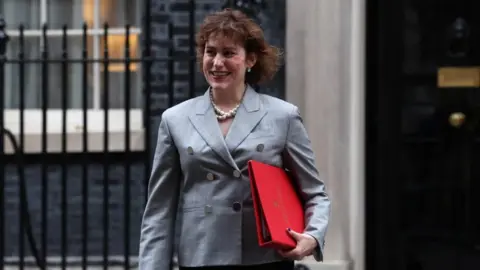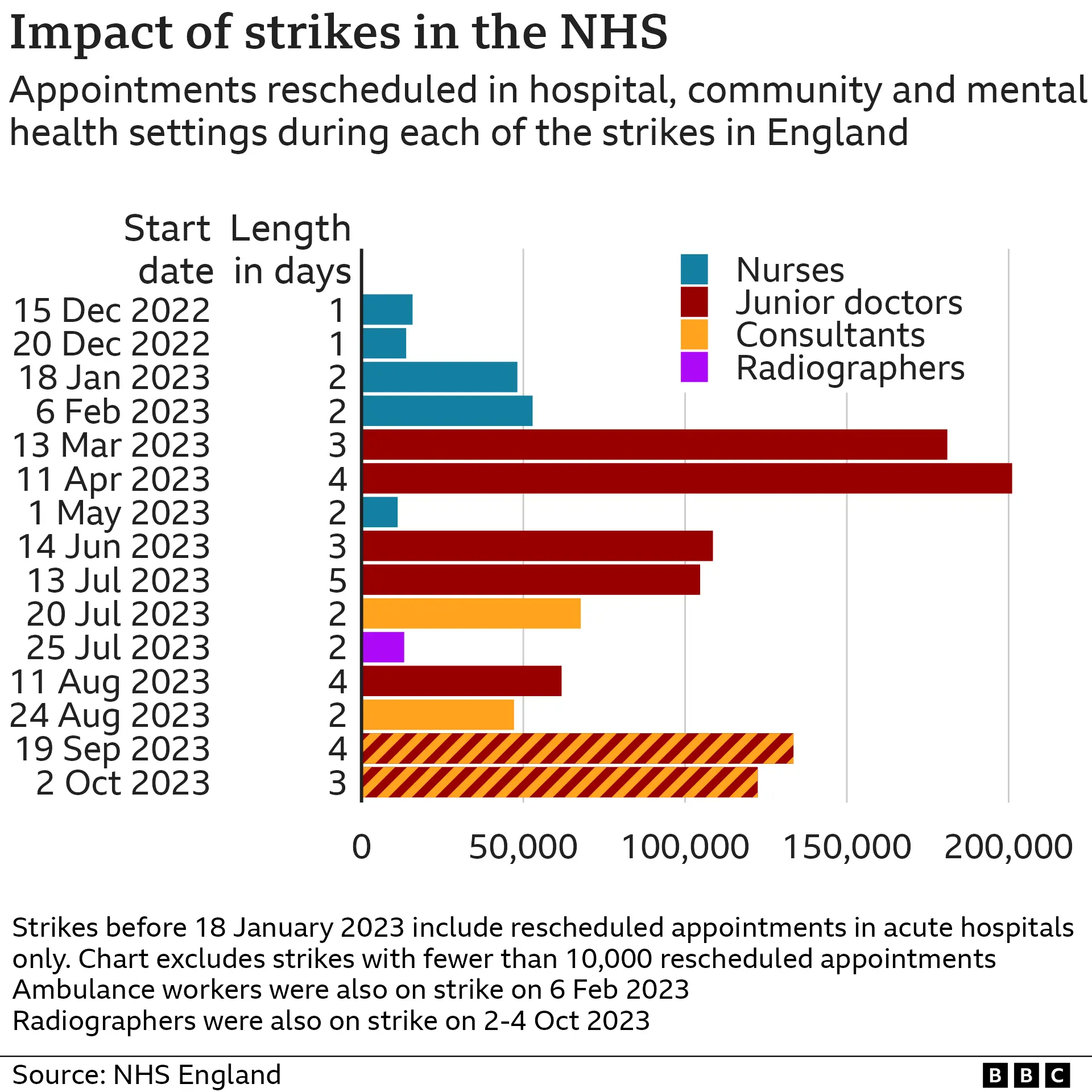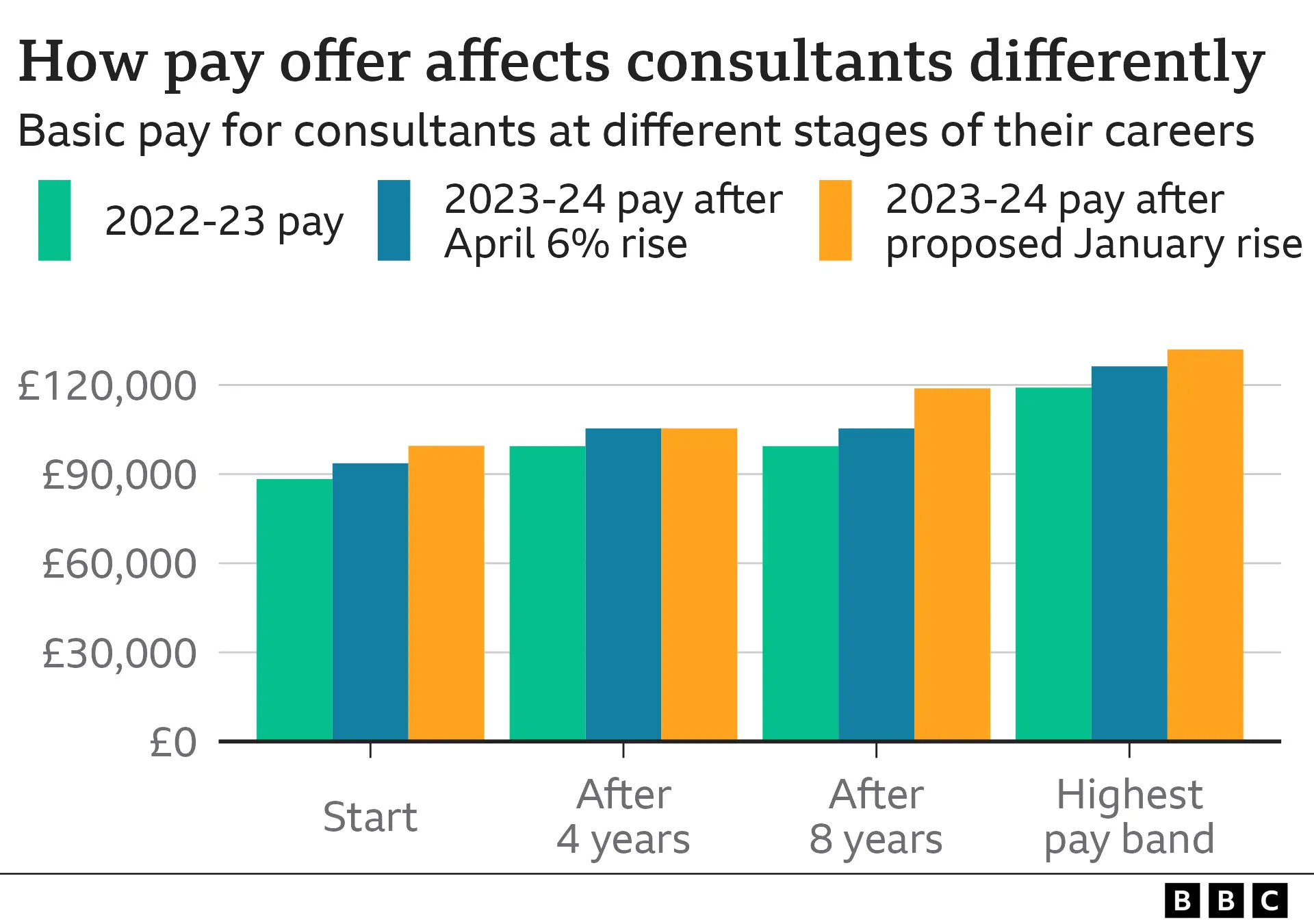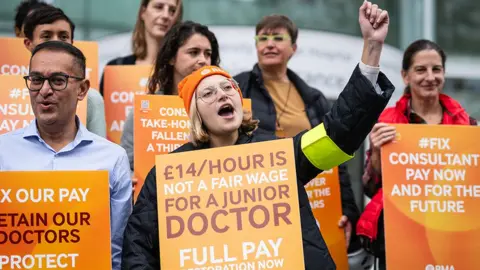How double pay rise for senior doctors is backfiring on government

 EPA
EPATwo weeks ago, the new Health Secretary, Victoria Atkins, spent the weekend signing off on a new pay offer for consultants, the most senior hospital doctors in the NHS.
She hoped it would mark the beginning of the end of the strikes in England that have plagued the health service for the past year.
After weeks of intense talks with the British Medical Association (BMA), a deal had been reached which the union's negotiators felt able to put forward to members. But could it now end up making things worse?
The deal was more generous than many expected. In fact, those close to the talks said Ms Atkins was only able to get it over the line because of her close relationship with the chancellor - before becoming health secretary in mid-November she was financial secretary at the Treasury.
Consultants - the best-paid frontline staff in the health service - are being offered a second pay rise of the financial year in England. Under the proposal, basic pay will increase by nearly 5% on average in January after a 6% rise in April.
The amount on offer differs depending on what stage a consultant is at. For some it will mean their salary rising by nearly 20% over the course of 2023-24.
'Appalled'
But already the shine has been taken off the breakthrough - even before voting papers have been sent out to consultants to see if they will accept the offer.
Soon after the announcement, the Royal College of Nursing (RCN) said it was "appalled" by the fact so much money had been found for the "highest earners" and warned it increased the likelihood of strikes by nurses returning.
Nurses - along with other health staff who are not doctors - were given 5% plus a one-off lump sum of at least £1,655 this year.

RCN leader Pat Cullen has since written to the health secretary asking for new pay talks, saying the consultants' pay offer will do nothing to "quell unrest" in the profession.
Her members actually rejected the pay deal when it was put forward in the spring, but because other unions representing ambulance staff, physios and midwives voted in favour it was introduced.
Longest strike
Then on Monday - exactly a week after the consultants' deal was announced - it got even worse for Ms Atkins as pay talks with junior doctor leaders at the BMA collapsed. These had been taking part simultaneously alongside the ones with consultants.
The following day, the co-chairs of the junior doctors committee, Robert Laurenson and Vivek Trivedi, released a statement saying what was on offer from the government was simply not credible, adding it amounted to an average of 3% extra. They have been calling for 35% more to make up for what they say is below-inflation pay rises since 2008.
They called the longest strike in the history of the NHS - a six-day stoppage at the start of the new year on top of a three-day walkout in the lead-up to Christmas.
In an interview with the BBC afterwards, Dr Trivedi defended the decision by making the point the money on offer was "less than what our consultant colleagues have been offered".
Those close to Ms Atkins said she was both disappointed and surprised by the actions of the junior doctor leaders - claiming the money on offer was not even a final position.
They also counter the argument that the government was willing to give consultants more, pointing out junior doctors had been given an average of nearly 9% in April compared to the across-the-board 6% consultants got.

What is more, the pay offer has been coupled with reform of the wider consultant contract, which, if accepted, will mean there are fewer pay bands. And that results in markedly different outcomes for consultants depending on what stage they are at.
Those at the bottom and top of the pay scales will see pay increase by a little over 10% this year (once the April pay rise is added to the proposed January one) while the ones in the middle, typically with eight years' experience, will see pay jump nearly 20% this financial year.
But those with around four years' experience will get nothing extra in January so are left with just the 6% rise they got from April.
Overall an extra 4.95% is being put into basic pay for consultants from January onwards, but about 1.5% is being clawed back by phasing out local excellence awards, which tops up pay. This is more likely to affect those at an earlier stage of their career as consultants who already have an award will get to keep it for the rest of their career.
The deal is so complicated and benefits individual consultants so differently that the BMA, while putting it to a vote of members, has felt unable to recommend they vote yes.
 Getty Images
Getty ImagesBMA sources meanwhile have defended the stance of junior doctors as well, saying the government had wasted weeks before starting talks with them - and the deadline for a deal by first week of December had been made clear a month before.
However, as the war of words continues, it looks like it will be patients who lose out. More than one million appointments and treatments have been cancelled since industrial action began with ambulance workers and nurses last December.
Strikes by doctors have been the most disruptive by far. And the next walkouts, particular the six-day walkout at the start of January, coincide with the most pressured points of the year.
"Our worst fear has come true," says Matthew Taylor, of the NHS Confederation, which represents hospital managers.
